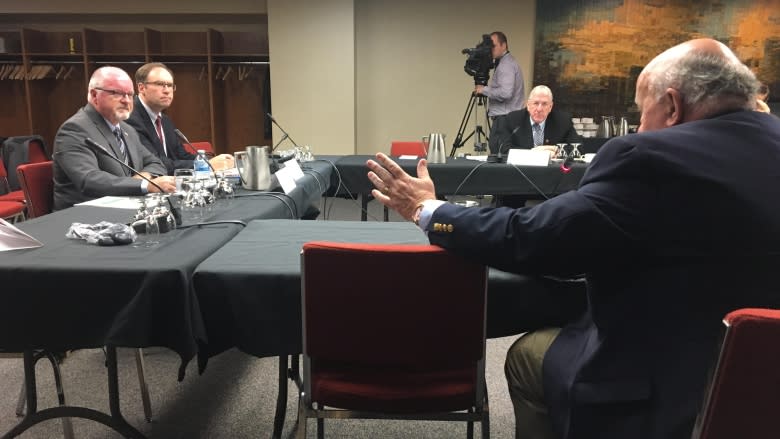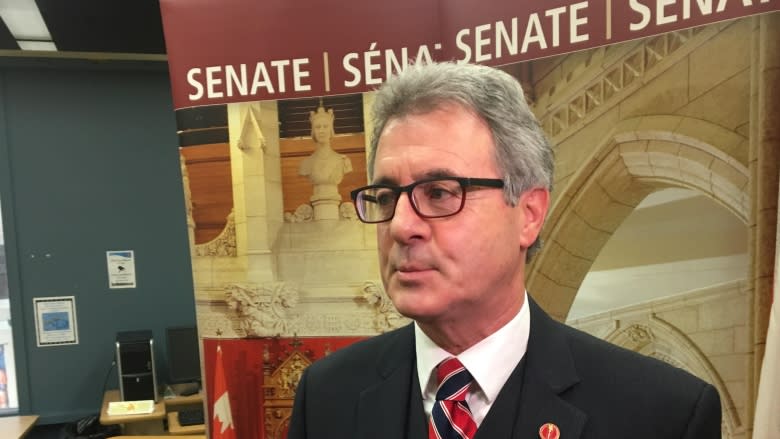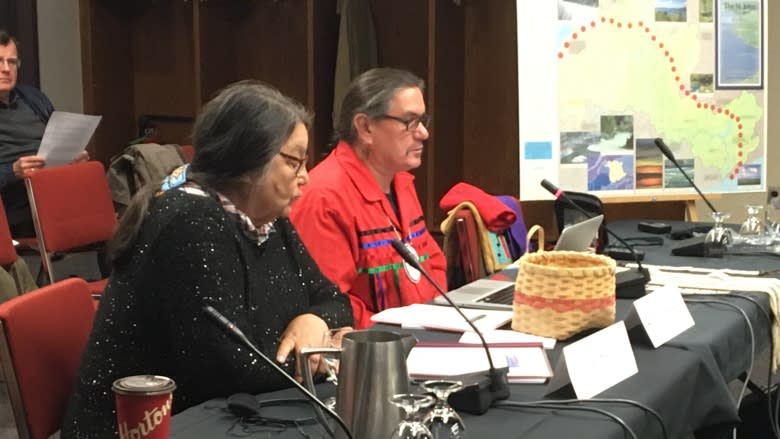Senate committee pushing for Energy East visits Saint John
The National Energy Board's review of the Energy East pipeline may be in limbo, but another process looking into the proposed route is still underway.
The Senate Transport and Communications Committee has been holding meetings across the country since March.
It's tasked with examining strategies to help transport crude oil to eastern refineries and ports on both coasts.
Five members of the 12 member committee spent the day in a Saint John Public Library boardroom hearing from groups with interests in crude oil transport.
Saint John is the planned end point of the Energy East pipeline and the committee spent a majority of its time focused on the project.
But while the NEB has a mandate to make recommendations to the government on whether the pipeline should be approved, Senator Michael MacDonald said the committee was different.
"We start with the premise that pipelines are a good thing, that we believe in them" said MacDonald.
The Cape Breton senator said he understands the contentious nature of Energy East, but he said the committee thinks getting oil to market on the east coast is in the national interest.
"We want to try to find the answers that we believe the government needs to help them make their decision."
Convincing the population
Many of the questions leveled against witnesses from both sides of the New Brunswick legislature were about how to convince residents it was in their best interest to accept the pipeline.
Some in favour of the pipeline, such as interim opposition leader Bruce Fitch, said it was important to ensure the right information was being spread.
Fitch drew a comparison between safety regulations for fracking and what he is now experiencing by being pro-Energy East.
"Even though I had the information and the working knowledge on how a well was constructed and the safeguards, the person would not believe that data," he said.
Fitch conceded there will be opinions held by many that won't be swayed regardless of what data they are shown.
Frosty reception
While the reception for most witnesses was generally cordial, it turned frosty for Lois Corbett and Matt Abbott representing the Conservation Council of New Brunswick.
The pair were grilled on numbers of right whales in the Bay of Fundy, which Abbott is concerned will suffer from increased shipping traffic.
Abbott conceded whale numbers have rebounded in recent years, but maintained his assertion the risk was still there.
Also appearing were Ron Tremblay, Grand Chief of the Wolastoq Grand Council and Alma Brooks, an elder from St. Mary's First Nation.
Both are adamantly against the pipeline over fears it will cause irreparable harm to Indigenous land in the event of a spill.
His voice often breaking with emotion, Tremblay said the project was not in the best interest of future generations.
"You might create a hundred jobs, but if there's a spill in the Bay of Fundy you're going to destroy 500 jobs," added Brooks. "It all depends on where those leaks happen and it's like I said before, it's not 'if,' it's 'when.'"
Not being consulted, said Grand Chief
Tremblay also said despite reaching out to TransCanada, he has not received a call back and hasn't been properly consulted.
TransCanada spokesperson Jonathan Abecassis said the company had met with Tremblay at an open house and had sent several policy updates to the Wolastoq Grand Council.
It is the company's policy, Abecassis said, to work directly with those whom elected officials have directed them.
Abecassis also said TransCanada respects the concerns people have in regards to potential spills.
While the pipeline would have real-time sensors and remote shutdown capabilities, Abecassis said pipelines are safer than rail transport.
The committee has until December to present its findings to the government.
Later this week it will continue its hearings in Halifax.




